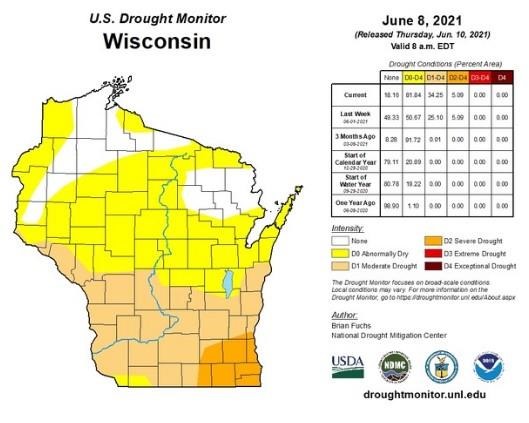Amaya Atucha is a fruit crop specialist for the University of Wisconsin-Madison’s Division of Extension. She said the hot and dry conditions over the last few weeks have put stress on everything from strawberry plants to apple orchards.
"Plants in general use water mostly to be able to control temperature. So the warmer it gets, the more water they need to be able to cool down," Atucha explained.
Most of the berry varieties grown in Wisconsin are not adapted to dry conditions, Atucha said. Plants may prematurely drop fruit or end up growing smaller berries, but most berry growers have been able to compensate for lack of rain through built-in irrigation systems that they use for frost control.
While irrigation isn’t as common in apple orchards and vineyards, Atucha said most producers are likely finding ways to water their plants too.
Fruit crops need adequate moisture at all stages of growth, she said, and without it, fruit quality and yields will suffer.
"We are about bloom time (for vineyards), so if there's a lot of stress, it's very possible that fruit set is affected. So you may end up with clusters that are incomplete, they don't have all of the berries and obviously that is going to impact the overall yield at the end of the season," Atucha said.
She said apple trees may drop fruit if they’re under too much stress as a way to lower their demand for water.
And Atucha warns the impact of drought stress could extend beyond this year’s crop.
"I don’t think a lot of people realize this, that when you have perennial crops as fruit crops, that many of the physiological processes tend to overlap," Atucha said. "Even though we’re just seeing the fruit of this year, starting right now, flowers for next year are going to come to form in those buds, that are going to have to survive the winter to next year."
That development, called flower initiation, could be affected if the plants don’t have enough water, Atucha said.
But Atucha said this year’s drought likely won’t cause long-term damage.
"If it rains, the vines will recover. So there will be an immediate impact on the vines or the trees right now, on this year’s crop or potentially next year, but it's not a lasting effect," Atucha said.

Click here to see more...